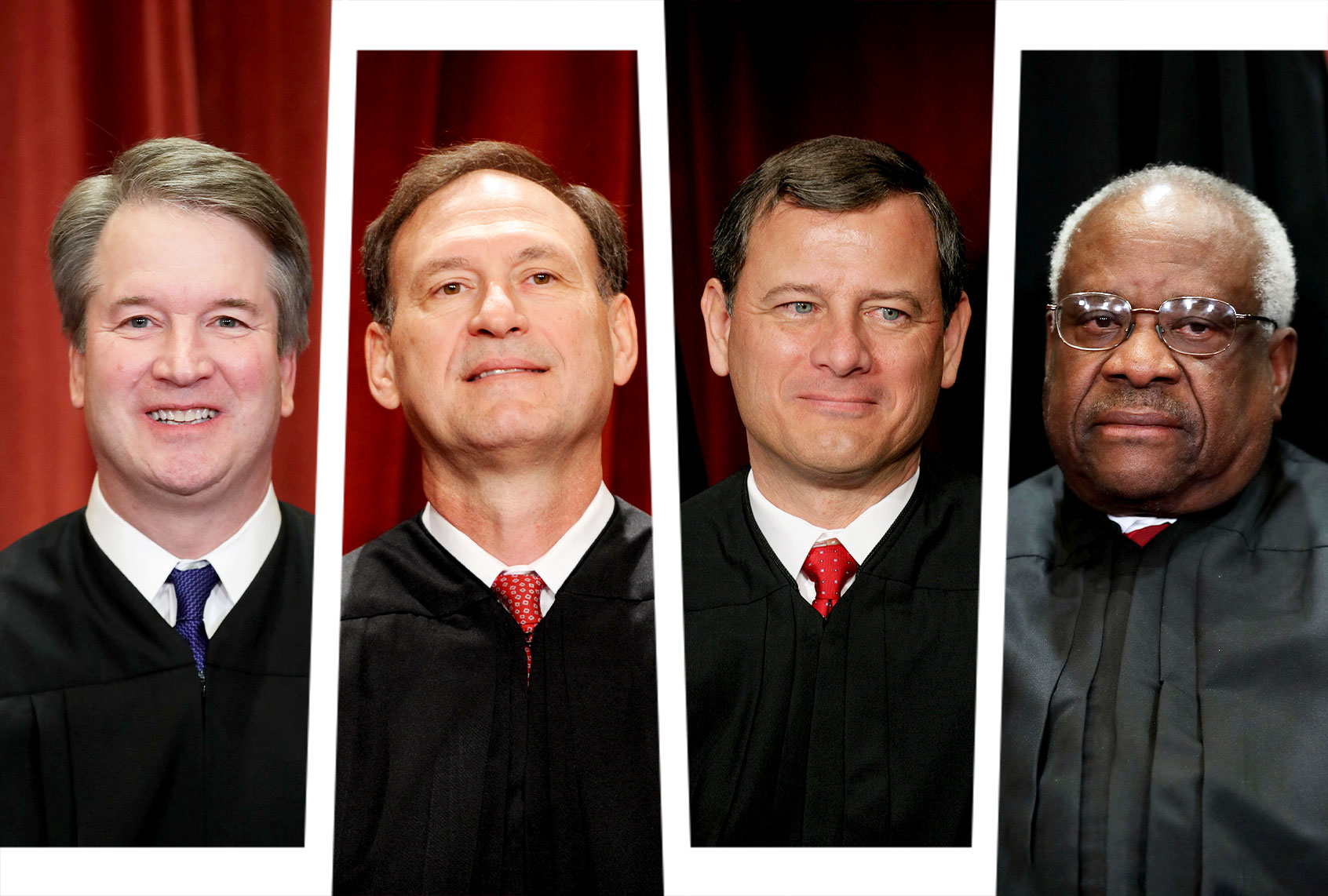The conservative majority of the Supreme Court overturned the landmark precedent on abortion rights on Friday, voting to strike down the 1973 Roe v. Wade ruling legalizing abortion nationwide.
“The Constitution does not confer a right to abortion,” Justice Samuel Alito wrote in the majority opinion, a draft of which was leaked to much uproar months ago. “It is time to heed the Constitution and return the issue of abortion to the people’s elected representatives.”
The court’s 6-3 decision in the case of Dobbs v. Jackson Women’s Health Organization upheld a Mississippi law that banned most abortions after 15 weeks of pregnancy. Technically, the vote to overturn Roe was 5-4, with Chief Justice John Roberts attempting to split the difference: In a separate concurring opinion, he agreed with the majority opinion on Dobbs but argued for “a more measured course,” saying he would have upheld the 1973 precedent. Justices Clarence Thomas and Brett Kavanaugh also wrote their own concurring opinions. In Thomas’ concurrence, he wrote that the court should now “reconsider” its decisions that found a right to contraception, sex between consenting adult men and same-sex marriage — and “correct the error” made in cases like “Griswold, Lawerence and Obergefell.” All three of the justices appointed by Donald Trump — Kavanaugh, Neil Gorsuch and Amy Coney Barrett — voted to overturn Roe after stating on the record during their Senate confirmation hearings that Roe was settled precedent.
Justices Stephen Breyer, Elena Kagan and Sonia Sotomayor dissented.
“One result of today’s decision is certain,” they wrote, “the curtailment of women’s rights, and of their status as free and equal citizens.”
The dissenting justices continued, taking aim at the majority by comparing them to conservative justices who previously served on the court.
“O’Connor, Kennedy, and Souter — they were judges of wisdom. They would not have won any contests for the kind of ideological purity some court watchers want Justices to deliver. But if there were awards for Justices who left this Court better than they found it? And who for that reason left this country better? And the rule of law stronger? Sign those Justices up.”
The 2018 Mississippi law at issue in the Dobbs case banned most abortions after 15 weeks of pregnancy, with no exceptions for cases of rape or incest. It prompted a lawsuit by the Jackson Women’s Health Organization, the state’s only abortion provider, which argued that Thomas E. Dobbs, Mississippi’s top health officer, was in violation of the Constitution. In November of that year, the case was heard by the U.S. District Court for the Southern District of Mississippi, which ruled in favor of the clinic.
However, by June 2020, the case had been appealed to the Supreme Court, which held oral arguments last December. During the proceeding, the court’s conservative wing appeared intent on effectively reversing Roe v. Wade, the landmark 1973 ruling that established America’s constitutional right to abortion.
“The Constitution is neither pro-life nor pro-choice on the question of abortion but leaves the issue to the people of the states or perhaps Congress to resolve in the democratic process,” conservative Justice Brett Kavanaugh said at the time, suggesting that abortion is not a constitutional right.
RELATED: Abortion opponents don’t care if pregnant women get murdered
Justice Amy Coney Barrett meanwhile asked whether “safe haven” laws, which allow parents to give up their babies as wards of the state, would help negate the need for abortions, since having birth does not necessarily require one to be a parent.
Justice Samuel Alito, perhaps the most consistently conservative voice on the bench, called Roe “egregiously wrong” and downplayed the consequences of overturning such a historic precedent.
Want a daily wrap-up of all the news and commentary Salon has to offer? Subscribe to our morning newsletter, Crash Course.
[Day’s] ruling comes just weeks after a leaked draft majority opinion, published by Politico in May, revealed that the Supreme Court had already informally voted to overturn Roe, turning back the clock of reproductive rights by half a century. At the time, the report’s release ignited a fury on both sides of the issue. Republicans raged over the leakage of the draft, arguing that it constitutes a criminal violation and warrants an official probe by the FBI. Democrats and pro-choice advocates sounded alarms over the ruling’s potential to clamp down on abortion access for millions of Americans, many of whom are already facing restrictions in GOP-led states.
The leak revived an ongoing effort by pro-abortion advocates to have U.S. lawmaker codify the rights set out by Roe. In May, the Democratic-majority House forced a Senate vote on a bill designed to do just that. But as expected, the Senate, which is evenly split between Democrats and Republicans, torpedoed the measure.
According to the Guttmacher Institute, 22 states have laws on the books that significantly limit abortion access, including Texas, Alabama, Arizona, and Idaho. Meanwhile, just sixteen have laws that explicitly protect the right to abortion.
RELATED: Corporate America steps up to fight for abortion access — after backing anti-abortion Republican


